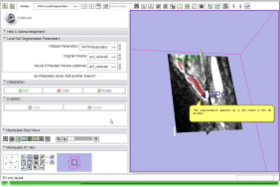Modules:VMTKEasyLevelSetSegmentation
Return to Slicer 3.4 Documentation
Module Name
VMTKEasyLevelSetSegmentation
General Information
Module Type & Category
Type: Scripted Module
Category: Segmentation, Extension
Authors, Collaborators & Contact
- Author: Daniel Haehn, University of Heidelberg
- Acknowledgments: Luca Antiga, Mario Negri Institute; Steve Pieper, Isomics Inc.
- Contact: Daniel Haehn, haehn@bwh.harvard.edu
Module Description
This module provides level-set segmentation in 3D Slicer using selected methods of the level-set segmentation process of the Vascular Modeling Toolkit (http://www.vmtk.org). The module targets easy-to-use manual segmentation of tubular and blob-like structures. The methods provided by this module are Fast Marching Upwind Gradient Initialization and Geodesic Active Contours.
Segmentation using level sets consists of an initialization and an evolution step. The initialization step involves the description of a starting model within a region of interest. In the evolution step this initial deformable model then gets inflated to match the contours of the targeted volume.
This work is part of the NA-MIC VMTK Collaboration.
Official project page: http://www.vmtk.org/Main/VmtkIn3DSlicer
Usage
Installation
This module depends on the VmtkSlicerModule: see this page for installation notes.
The VMTKEasyLevelSetSegmentation module can be installed as a 3D Slicer Extension or manually.
- Installation as a 3D Slicer Extension
Inside the 3D Slicer extension system, the module is called VMTKEasyLevelSetSegmentation.
- Manual Installation
1. To get the latest source code, perform the following SVN checkout command:
svn checkout https://www.nitrc.org/svn/slicervmtklvlst
2. A directory named VMTKEasyLevelSetSegmentation is downloaded.
3. Copy this directory to Slicer3-build/lib/Slicer3/Modules/ of your local Slicer installation.
When the module was successfully installed, it is available within 3D Slicer's module selector inside the category Vascular Modeling Toolkit.
Examples, Use Cases & Tutorials
The following screencasts/tutorials show different Use Cases of the VMTKEasyLevelSetSegmentation module.
- Use Case #1: Branch-by-Branch Segmentation of vessels in an arm using Colliding Fronts
 Watch the video.. |
A screencast showing the segmentation of vessels in an arm by using the Colliding Fronts algorithm for branch-by-branch segmentation. 3D seeding is used to place fiducials and the Undo function during the level-set segmentation process is explained as well. Watch the video here. |
- Use Case #2: Extraction of a Coronary Tree inside a cardiac blood-pool MRI by using only one fiducial point and Fast Marching
 Watch the video.. |
This screencast shows the extraction of a coronary tree inside a cardiac blood-pool MRI by using a combination of the VMTKVesselEnhancement and the VMTKLevelSetSegmentation modules. Only one fiducial point is used as a source point for the Fast Marching algorithm. Watch the video here. |
- Use Case #3: Segmentation of a Cerebral Aneurysm and its connecting vessels using Colliding Fronts and Fast Marching
 Watch the video.. |
The segmentation of a cerebral aneurysm and its connecting vessels is shown in this screencast. The VMTKVesselEnhancement module is used as a pre-processing step and the segmentation of the connecting vessels is performed on the vessel enhanced image with the Colliding Fronts algorithm. The segmentation of the actual aneurysm is performed on the original image. How to switch between these images during the initialization stage easily is explained as well. Watch the video here. |
Quick Tour of Features and Use
The VMTKEasyLevelSetSegmentation has three panels.
The module supports the 3D Slicer built-in Undo function.
All generated binary volumes and used fiducials are saved as MRML nodes in the current MRML scene. Therefore these can be exported or saved.
Development
Dependencies
This module depends on the VMTK libraries which are provided in the VmtkSlicerModule. Therefore the VmtkSlicerModule has to be installed before the VMTKLevelSetSegmentation module can be used.
Known bugs & Usability issues
Follow this link to the VMTK in 3D Slicer bug tracker.
Source code & documentation
VMTKEasyLevelSetSegmentation is a Python Scripted Module. It follows the conventions of the Model View Controller pattern of slicer modules. This implies the separation of logic and GUI.
The class VMTKEasyLevelSetSegmentationGUI derives from ScriptedModuleGUI and saves the current parameters to its own MRML node. The actual calls to the VMTK libraries as well as the Marching Cubes or Volume Rendering methods are performed in the class VMTKEasyLevelSetSegmentationLogic. Several general supporting functions are outsourced in the class VMTKEasyLevelSetSegmentationHelper.
The complete source code is available at a NITRC SVN repository.
More Information
Acknowledgment
This work was funded by a grant of the Thomas-Gessmann Foundation part of the Founder Federation for German Science.
References
- Piccinelli M, Veneziani A, Steinman DA, Remuzzi A, Antiga L (2009) A framework for geometric analysis of vascular structures: applications to cerebral aneurysms. IEEE Trans Med Imaging. In press.
- Antiga L, Piccinelli M, Botti L, Ene-Iordache B, Remuzzi A and Steinman DA. An image-based modeling framework for patient-specific computational hemodynamics. Medical and Biological Engineering and Computing, 46: 1097-1112, Nov 2008.






